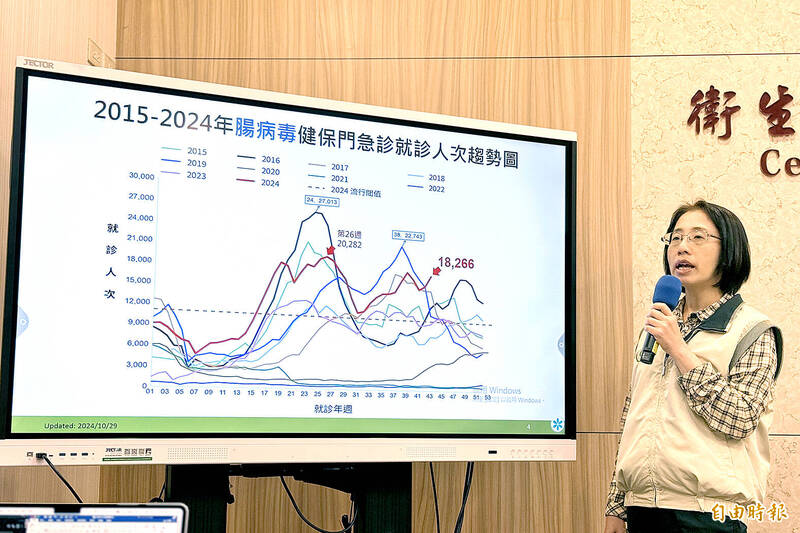《TAIPEI TIMES》 Enterovirus infections highest in decade: CDC

Centers for Disease Control Epidemic Intelligence Center Deputy Director Lee Chia-lin discusses data on enterovirus activity at a news conference in Taipei yesterday. Photo: Chiu Chih-jou, Taipei Times
FATALITY: Three new cases of melioidosis were also confirmed last week, all in Kaohsiung, and one of them — a man in his 60s — died shortly after being diagnosed
By Lee I-chia / Staff reporter
A total of 18,266 hospital visits for enterovirus infection were reported last week, the highest in a decade, while enterovirus activity is predicted to remain abnormally high until late next month, the Centers for Disease Control (CDC) said yesterday.
Hospital visits for enterovirus infection increased by 10.3 percent last week and enterovirus activity continues to increase, remaining above the epidemic threshold, CDC Epidemic Intelligence Center Deputy Director Lee Chia-lin (李佳琳) said.
Monitoring data from contracted laboratories showed coxsackievirus A16 to be the dominant strain, followed by coxsackievirus A6, in the past four weeks, she said.
“The recent enterovirus activity is somewhat abnormal, as it has continued to heighten in the autumn and winter,” CDC Deputy Director-General Philip Lo (羅一鈞) said, adding that a winter outbreak was last seen in 2016.
Epidemic simulations suggest that enterovirus activity has reached a plateau, which is expected to extend into middle or late next month, with peak weekly hospital visits reaching between 19,000 and 20,000, he said, adding that weekly hospital visits could fall below the epidemic threshold by the end of the year.
“The prolonged enterovirus outbreak will cause more young children to become infected and their classes to be suspended, so we urge parents [or caregivers] and teachers especially to remind children to wash their hands frequently, and maintain good sanitation and hygiene,” he said.
Meanwhile, Lee said that seven new cases of locally acquired dengue fever were confirmed last week, including five in New Taipei City, and one each in Taipei and Changhua County.
Contact tracing and genome sequencing suggested that all seven cases, including the two latter cases, are associated with a cluster of cases previously reported in New Taipei City, she said, adding that so far there have been 77 cases associated with the cluster.
In addition, three new cases of melioidosis were confirmed last week, all in Kaohsiung and reported after Typhoon Krathon, and one of them — a man in his 60s — died shortly after diagnosis, Lee said.
CDC physician Lin Yung-ching (林詠青) said the man had multiple chronic diseases and sought medical treatment for shortness of breath on Tuesday last week, but died of septic shock, severe pneumonia and respiratory failure on the same day.
The man lived alone and there was no flooding near his home during the typhoon, and he was not directly exposed to contaminated water or soil, so the source of infection is unclear, Lin said, adding that he might have acquired the disease by inhaling contaminated dust or water droplets.
It is the second melioidosis death since Typhoon Krathon earlier this month, the CDC said.
To mark World Stroke Day yesterday, Lo said some studies suggest that getting vaccinated against influenza and COVID-19 could also help reduce the risk of a stroke.
Tang Chih-wei (唐志威), head of Far Eastern Memorial Hospital’s Stroke Center, said that flu or COVID-19 infection can cause a systemic inflammatory reaction, accelerating the development of atherosclerosis (thickening or hardening of the arteries), thereby increasing the risk of embolic stroke.
Contracting the flu or COVID-19 can also cause symptoms including fever, rapid heartbeat and shortness of breath, which also increase the burden on the cardiovascular system, he said.
“People with cerebrovascular or cardiovascular disease should especially prevent themselves from contracting the flu or COVID-19, and the best way is to get vaccinated,” Tang said, adding that there are foreign studies that also suggest getting flu and COVID-19 vaccines could reduce the risk of developing a stroke and other cardiovascular events.
However, if a person has had a stroke, they should wait about one or two weeks and consult a doctor about their health before getting vaccinated, he said.
Government-funded influenza and COVID-19 vaccinations began on Oct. 1, and the second phase is to begin on Friday, expanding eligibility for the flu vaccine to people aged 50 or older, and the COVID-19 vaccine to people aged six months or older, the CDC said.
新聞來源:TAIPEI TIMES




















